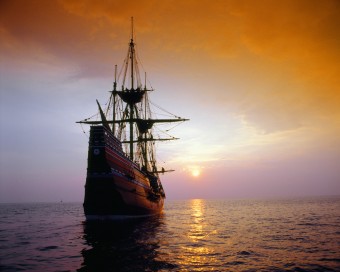This Day in History: September 16th
Today In History: September 16, 1620
 On this day in history, 1620, the Mayflower set sail from Plymouth, England heading for the New World with 102 souls aboard- some religious dissenters, many others adventurous entrepreneurs.
On this day in history, 1620, the Mayflower set sail from Plymouth, England heading for the New World with 102 souls aboard- some religious dissenters, many others adventurous entrepreneurs.
The colonists, who were headed for Virginia, had been given official authorization to settle there by royal authority. As fate would have it, rough seas and storms coupled with navigational mistakes led the Mayflower about 500 miles off course.
After an arduous 66-day voyage, on November 21st, the colonists landed at the tip of Cape Cod at Provincetown, Massachusetts. After dropping anchor in Provincetown Harbor, Captain Myles Standish and a group of men set out to explore the lay of the land and to find a suitable area to build a settlement.
During their absence, Susanna White gave birth to a son, Peregrine, who was the first English child born in New England. (Susanna would soon become the only surviving widow in the colony when her husband, William White, died the first winter.)
William wasn’t the only casualty. During the first year, over half of the settlers lost their lives to illness, but by 1621, things for the colonists was looking up after a bountiful harvest in the following autumn.
The economy steadily grew, attracting more colonists to the area, and by the 1640s Plymouth boasted a population of roughly 3,000 people. But by that time, Massachusetts had an even larger settlement – the Massachusetts Bay Colony to the north. The New World, and New England, had only just begun its long march into history.
If you liked this article, you might also enjoy our new popular podcast, The BrainFood Show (iTunes, Spotify, Google Play Music, Feed), as well as:
- The Pilgrims Did Not Celebrate the First Thanksgiving in America
- The Pilgrims Did Not Wear Black and White Clothing and Buckled Hats
- 10 Interesting Thanksgiving Facts
- 10 Thanksgiving Myths Dispelled
- The Author of “Mary Had a Little Lamb” was Largely Responsible for the Establishment of the Thanksgiving Holiday and the Traditions Associated With It (most of which aren’t historically based)
Bonus Facts:
- The first record of the term “pilgrim” applying to the Mayflower passengers, and those of their group that followed later, appeared in William Bradford’s Of Plymouth Plantation. In it, he used biblical imagery to describe the Pilgrim’s departure from Leiden in 1620: “So they lefte goodly & pleasante citie, which had been ther resting place, here 12 years; but they knew they were pilgrimes, & looked not much on these things; but lift up their eyes to ye heavens, their dearest cuntrie, and quieted their spirits.”
- The next two instances of them being called “Pilgrims” came when Nathaniel Morton and Cotton Mather in 1669 and 1702, respectively, both paraphrased Bradford’s words. The next reference was in 1793 by Rev. Chandler Robbins who recited Bradford’s words at a Plymouth Forefathers’ Day observance. From here, the term caught on and it became popular to toast to the “Pilgrims of Leyden” on this observance day. By 1820, Daniel Webster referred to this group as the “Pilgrims” at the Plymouth’s bicentennial, which is hugely responsible for the term being picked up popularly as the name of this group.
- Myth: The pilgrims invited the Indians to the harvest festival that was partially Sarah Hale’s inspiration for a national Thanksgiving holiday. In fact, from Edward Winsolw’s letter in December of 1621 and William Bradford’s passage in “Of Plymouth Plantation”, which are the only two first-hand passages that directly describe the event, the wording seems to imply that the Indians simply stopped by at random times throughout the festivities to see what was going on. Nowhere does it say they were invited. It is likely that the noise, from the various shooting games and the like, is what brought them over to investigate what was going on.
- Another myth surrounding the Pilgrims is that they would have probably died had the Native Americans not taught them various agricultural tips and tricks. In fact, the Pilgrims didn’t come so unprepared. They had a contract with various merchants who would come regularly to bring them supplies of food, clothing, etc. for a term no less than seven years, while they established their colony. They were also well versed in hunting and farming techniques from Europe. When the Pilgrims left, they were quite well aware of the colonies that had tried to settle in America and failed, as well as much of the reasons for failure; thus, they took appropriate steps to avoid that happening to them.
| Share the Knowledge! |
|




